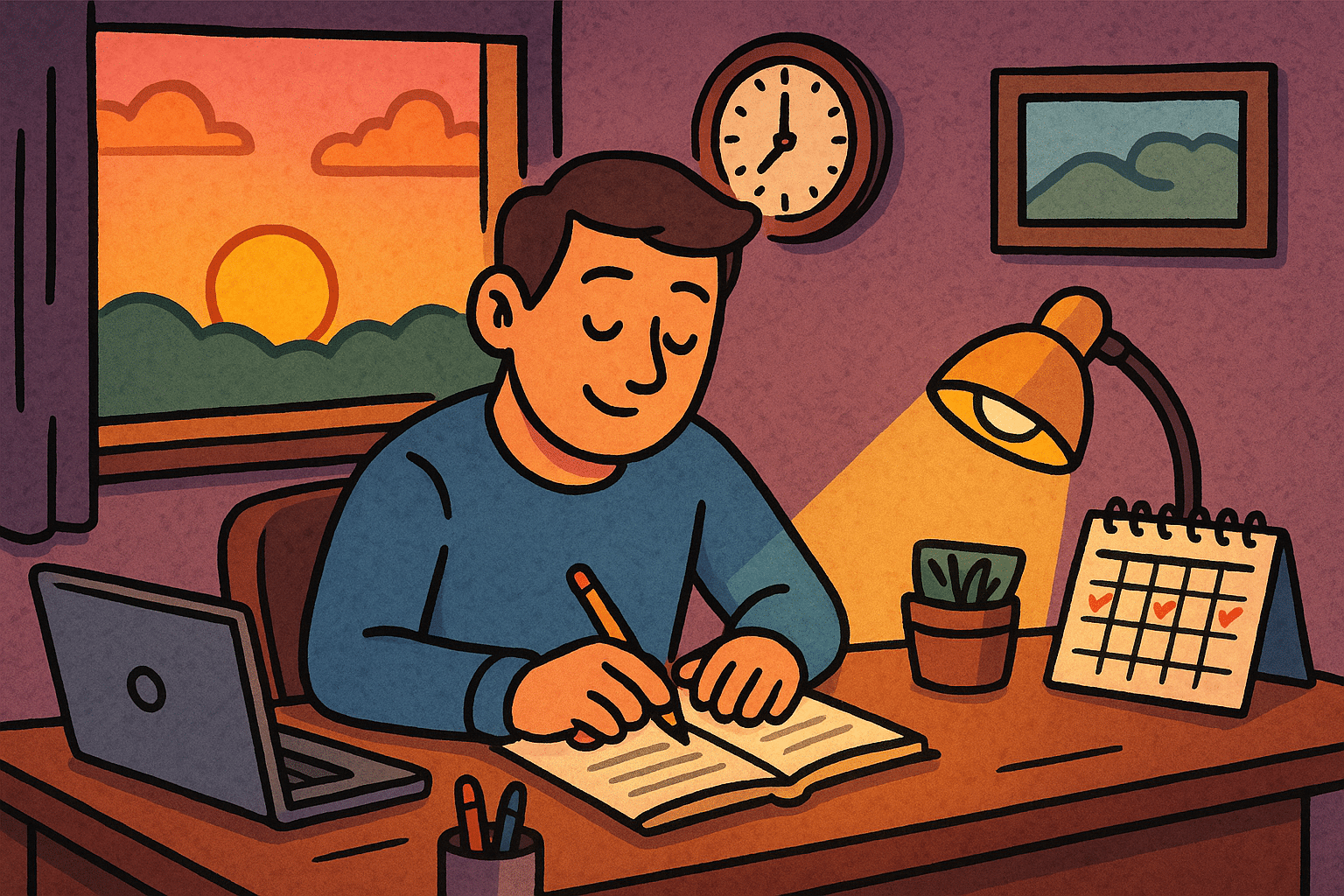In today’s fast-paced world, many of us find ourselves overwhelmed with constant tasks, emails, meetings, and digital distractions. The result? We rarely have time to think—really think—about the work that matters most. We are so busy putting out fires that we forget to take a step back and reflect, plan, or create. This article will explore how to intentionally create space in your week to allow for deep thought, reflection, and strategic thinking—something that is essential in a world that seems to value speed over depth.

Why Thinking Time Is Important
Before we dive into how to create space in your week, let’s first examine why it’s important to prioritize thinking. In a 2023 report by the World Economic Forum, experts pointed out that cognitive overload, which occurs when we’re constantly switching between tasks, can be detrimental to decision-making and creativity. Without dedicated time to process information, think critically, and reflect, we may miss opportunities for innovation or fall into the trap of reactive decision-making.
Thinking is the foundation of creativity and productivity. When we carve out time to think deeply about our goals, challenges, and strategies, we give ourselves the chance to make informed decisions. In a recent study published in the Harvard Business Review, researchers found that executives who regularly set aside time for strategic thinking were 3.5 times more likely to lead successful teams.
1. Identify Your Time Gaps
The first step in creating space for thinking is identifying where you already have time gaps in your week. These might be pockets of time where you’re not yet productive, or times when you’re waiting for something—like your next meeting or a conference call to start. Instead of filling these moments with distractions like checking emails or social media, use them to plan or reflect.
Take out your calendar and pinpoint time slots that are currently unaccounted for. If you can identify 30-minute or hour-long gaps, you can start dedicating these blocks for thought-focused activities, like brainstorming, reading, or processing information.
Tip: If your schedule is jam-packed, you may need to shuffle some meetings or activities around to ensure you have uninterrupted thinking time.
2. Schedule Thinking Time Just Like Any Other Task
Most people wouldn’t cancel a meeting with their boss, yet we often cancel time we’ve dedicated to thinking. The key to making thinking time a non-negotiable part of your week is to schedule it.
Create a “thinking block” in your calendar, and treat it like an important meeting. Whether it’s an hour at the start of your day, or a mid-afternoon break, make it part of your routine. Research shows that when you schedule activities in advance, you’re more likely to stick to them. So, by simply blocking off thinking time as you would a meeting, you increase the likelihood that you’ll commit to it.
3. Protect Your Time from Distractions
If you’re truly committed to making thinking time a priority, it’s crucial to eliminate distractions during this period. Put your phone on airplane mode, close all irrelevant browser tabs, and put a “do not disturb” sign on your door if you work in a shared space.
A study from Calm.com in 2022 showed that it takes an average of 23 minutes to regain focus after an interruption. So, even if your thinking time is only 30 minutes long, you’re wasting valuable time if you allow interruptions to break your focus. This is why it’s important to block off uninterrupted time.
Tip: Set boundaries with colleagues and family members. Let them know that during your designated thinking hours, you need to focus without disruption.
4. Create a Comfortable, Quiet Space for Thinking
Where you think is just as important as when you think. The ideal thinking environment is quiet, free of distractions, and conducive to deep reflection. If you can, set up a space that’s just for thinking. Whether it’s a cozy corner in your home, a quiet coffee shop, or an unused conference room at work, ensure the environment supports mental clarity.
Research from The University of California has found that exposure to natural light and minimal noise significantly enhances cognitive function and creative thinking. When designing your thinking space, consider factors such as lighting, seating, and the level of background noise. A well-thought-out environment can help you get into the right mindset to generate new ideas and tackle complex problems.
5. Limit Multitasking
It’s tempting to try and do more things at once—especially when you’re busy—but research has shown that multitasking reduces cognitive performance. When you’re trying to think deeply, it’s essential to focus solely on that task.
A 2022 study by Stanford University revealed that multitaskers experience reduced cognitive control and worse long-term retention. Multitasking may seem efficient, but it actually hampers your ability to think clearly and creatively. So, during your thinking time, focus on one thing and one thing only. Whether that’s mapping out your strategy for the week, brainstorming a new project, or simply reflecting on your current workload, commit to deep thought without juggling multiple tasks.
6. Use Tools to Facilitate Reflection
Sometimes, a little guidance can help you get started during your thinking time. One way to enhance your thinking is by using structured tools like mind maps, journaling, or strategy frameworks. These methods can help you organize your thoughts, identify patterns, and generate new ideas.
For example, if you’re facing a tough decision at work, use a decision matrix to weigh the pros and cons. Or, if you’re working on a creative project, try using a mind map to visualize different ideas and how they connect. These tools provide structure that can turn your thinking time into productive action.
7. Practice the Art of “Doing Nothing”
In a culture that glorifies busyness, taking time to do nothing might seem counterproductive. However, allowing your mind to wander is essential for creativity and mental recovery. In fact, some of the best ideas come to us when we’re not consciously trying to solve a problem.
Take a walk, meditate, or simply sit in silence for a few minutes each day. A study from Princeton University found that periods of rest and mind-wandering are critical for memory consolidation and creative breakthroughs. The next time you feel like you have nothing to do, embrace the opportunity to think without pressure or a specific goal in mind.
8. Incorporate “Think Weeks” into Your Schedule
If you really want to supercharge your thinking, try dedicating an entire week to focused thought. This could be a week where you completely disconnect from your day-to-day tasks and dedicate time to higher-level thinking. Bill Gates famously takes “Think Weeks” a couple of times a year, where he locks himself away with books and his thoughts to reflect on big ideas and the future of his work.
While it may not be feasible to take an entire week off for thinking, you can start by blocking off a few days to focus solely on strategic planning, personal reflection, or even just reading. The important thing is to give yourself the space to think deeply without the constraints of daily tasks.
9. Prioritize Rest for Mental Clarity
Rest is often overlooked when we talk about productivity. However, adequate sleep and downtime are crucial for cognitive function and the ability to think clearly. According to a 2023 Sleep Foundation report, insufficient sleep has been linked to impaired memory, concentration, and decision-making. Ensure you’re getting enough sleep each night, and take breaks throughout the day to recharge.
Conclusion
In a world filled with constant distractions and demands on our time, creating space to think is more important than ever. By carving out intentional time for reflection, eliminating distractions, and adopting tools to facilitate your thinking process, you can gain mental clarity and make better decisions. Start by identifying time gaps in your week, scheduling dedicated thinking hours, and ensuring your environment is conducive to focused thought. With the right approach, you can regain control of your time and create a week that allows for both action and meaningful reflection.
Reference
- Harvard Business Review – The Power of Time Away from Work. Available at: https://hbr.org (Accessed: 25 June 2025).
- Stanford University – The Cognitive Benefits of Doing Nothing. Available at: https://news.stanford.edu (Accessed: 25 June 2025).
- Princeton University – The Science of Mind-Wandering. Available at: https://www.princeton.edu (Accessed: 25 June 2025).






